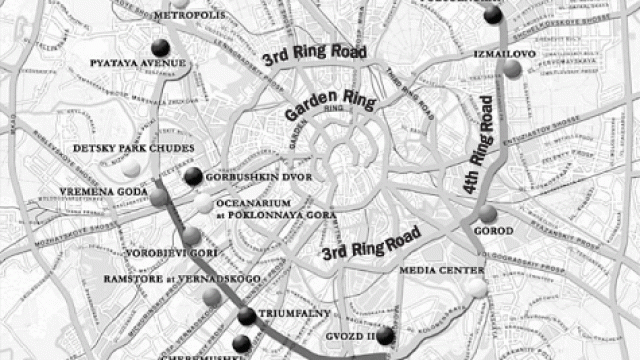In its first-quarter retail-market report, Colliers International predicted that not only would the road improve traffic conditions but that it would also offer access to new, large sites for commercial real estate development.
The road -- the plan and timeline for which were approved during the first quarter -- is to be built between the Third Ring Road and the Moscow Ring Road, or MKAD.
Colliers International's report states that gradual growth in the Fourth Ring Road's appeal should be expected due to a long schedule of construction, with commissioning of the first stage, from Volgogradsky Prospekt to Dmitrovskoye Shosse, planned for 2012-13.
"It will provide the conditions for a step-by-step development of adjacent territories with new commercial real estate projects and, hence, will cause gradual increase in competition between new shopping centers," the report states.
Currently, a number of major retail centers are already operating near the future ring road's route, totaling roughly 254,000 square meters, including the 51,200-square-meter Gorbushkin Dvor. Another 419,900 square meters of retail space is under development around the route, including the 140,000-square-meter Gorod development on Ryazansky Prospekt. Among projected developments are the 240,000-square-meter Rostokino complex on Prospekt Mira and the 205,000-square-meter Metropolis retail-entertainment center on Leningradskoye Shosse.
Commercial real estate company Praedium's first-quarter overview noted that a shortage of land sites in the capital, combined with the attractiveness of less-competitive regional markets, was resulting in a high number of retail development projects in the regions, adding that the same factors were driving retail development in Moscow's outskirts and surrounding areas.
Competition between retail complexes is increasing, the report states, and is changing from quantitative to qualitative.
"Not well-enough thought-out shopping centers are facing the challenge of redesigning their concepts," the report states. "Creation of a competitive shopping center's concept becomes vital already [in] the early stage."
Consumer spending in Russia amounted to $2,394 per capita in 2005, according to the Global Retail Newsletter, and is expected to reach $2,748 in 2006. The Russian retail market is estimated to generate $129 billion annually.
As companies rush to provide places in the capital where consumers can spend money, the retail sector's vacancy rates remain low-- between 3 and 5 percent, according to Praedium. Rental rates range from $150 to $2,500 per square meter per year for locations on the city's outskirts, and from $600 to $4,000 per square meter per year for locations on main streets.
The Global Retail Newsletter rated Moscow fifth worldwide in terms of downtown retail rental rates, behind Hong Kong, London, Paris and Sydney.
Analysts say this year will see an increase in retail properties on the MKAD, a trend toward setting rental rates as a percentage of turnover, a rise in nominal dollar rental rates in the case of ruble appreciation against the U.S. dollar or euro, and further development of the department-store sector.
While developers continue to build shopping malls in Russia, they are also showing interest in factory outlets.
Charles Slater, deputy head of retail services at Cushman & Wakefield Stiles & Riabokobylko, said there were several developers interested in building factory outlets but that there was no way to predict when they would actually be built, since full-price retail was doing well.
According to data released by the company, vacancy rates at Moscow shopping centers declined from 1.6 percent in 2004 to 0.7 percent in 2005. However, the vacancy rate increased to 1.46 percent in March, compared to 0.84 percent in February.
There are more than 80 existing shopping centers in Moscow, and 21 new ones are scheduled to open in 2006.
Vyacheslav Kaminsky, president of DVI Group, a company that invests in the development of shopping and entertainment complexes in Russia, said more than 200 shopping malls were expected to open in Russia in 2006.

A Message from The Moscow Times:
Dear readers,
We are facing unprecedented challenges. Russia's Prosecutor General's Office has designated The Moscow Times as an "undesirable" organization, criminalizing our work and putting our staff at risk of prosecution. This follows our earlier unjust labeling as a "foreign agent."
These actions are direct attempts to silence independent journalism in Russia. The authorities claim our work "discredits the decisions of the Russian leadership." We see things differently: we strive to provide accurate, unbiased reporting on Russia.
We, the journalists of The Moscow Times, refuse to be silenced. But to continue our work, we need your help.
Your support, no matter how small, makes a world of difference. If you can, please support us monthly starting from just $2. It's quick to set up, and every contribution makes a significant impact.
By supporting The Moscow Times, you're defending open, independent journalism in the face of repression. Thank you for standing with us.
Remind me later.

